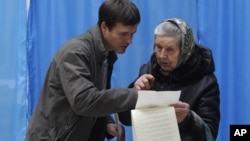KYIV —
Exit surveys of voters in Ukraine’s parliamentary elections indicate that the nation’s three opposition parties performed strongly, winning about half of the seats allotted by party lists.
Analysts call Sunday’s vote a test of Ukraine’s democratic credentials as it balances relations between the European Union and Russia. Midway through the five-year presidency of Viktor Yanukovych, opposition critics say the elections are critical to curb authoritarian moves by Yanukovych.
Analysts call Sunday’s vote a test of Ukraine’s democratic credentials as it balances relations between the European Union and Russia. Midway through the five-year presidency of Viktor Yanukovych, opposition critics say the elections are critical to curb authoritarian moves by Yanukovych.
According to television projections, the opposition parties might win a narrow majority of the 225 allotted seats. But the other 225 seats are reserved for candidates running individually. Critics say it will be difficult to monitor vote counting in each of these districts.
Many candidates ran as independents. President Yanukovych is expected to draw many independents into his ruling coalition. Exit surveys indicated that as many as one-third of voters cast their ballots for the president’s Regions Party, and that about 11 percent of voters selected Yanukovych's parliamentary ally - the Communist Party of Ukraine.
Prime Minister Mykola Azarov said the ruling party is the clear victor in the elections. Other Regions Party officials predicted that the ruling party would win a parliamentary majority.
Political scientist Olexiy Haran at Kyiv Mohyla University says independents will play a key role in Ukraine's politics. “It’s more or less clear that a lot of MPs [i.e., members of Parliament] would be so-called independent, and in the future - in the future parliament - there would be pressure on them to join the pro-government coalition,” he said.
Analysts say that the independents might be needed by Mr. Yanukovych to form a 51 percent majority in the 450-member parliament. But, they add, the president is unlikely to hold the two-thirds majority needed to allow him to change Ukraine’s constitution.
Preliminary results are expected on Monday, but final composition of the new parliament might not be known for weeks.
Surveys indicate that about one-quarter of the electorate cast ballots for the Fatherland Party of Yulia Tymoshenko. Tymoshenko, a former prime minister, was unable to run because she is serving a seven-year jail term for abuse of office. Many analysts say Tymoshenko’s imprisonment has bolstered her political fortunes. Arseniy Yatsenyuk, the standard bearer of the Fatherland Party, vowed Sunday night to fight for a fair vote count.
Exit surveys of voters indicate strong showings for two parties that are new on the national scene. UDAR, or Punch - the party of heavyweight champion boxer Vitaly Klitschko - appeared to draw about 15 percent of the party list vote. And the nationalist party Svoboda, or Freedom, appeared to draw about 12 percent of the vote. Both parties favor stronger ties with the European Union.
Fatherland and UDAR are already in a formal parliamentary alliance. Klitschko said he would join the opposition alliance after Sunday’s vote. After the polls closed, Oleksandr Turchynov, a Svoboda leader, promised to maintain his opposition alliance with the Fatherland Party.
Many Ukrainians say the election results will shape the future of democracy in their country - the second largest nation after Russia to emerge from the former Soviet Union. About 3,500 international observers monitored the balloting. Opposition politicians charge that there was widespread fraud, including the false registering of several hundred thousand voters as sick, so that voting could take place without being monitored.
Many voters complained of confusing ballots. Three Green Parties were listed. In many areas, popular opposition candidates found themselves competing on ballots with unknown candidates with the same last name.
In a nationwide survey conducted earlier this month, 47 percent of respondents said they feared that voting irregularities would be so significant that they would effect the outcome of the elections.




